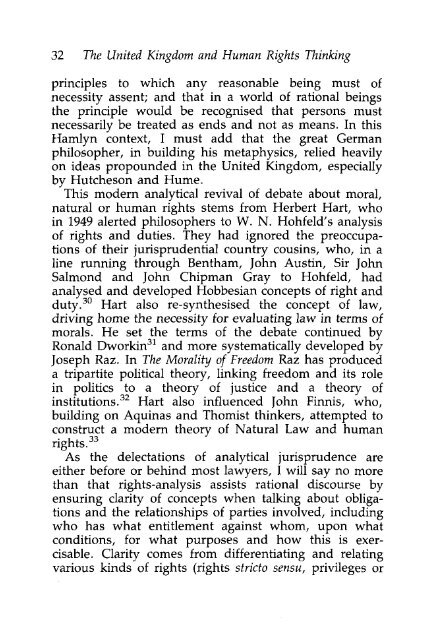The United Kingdom and Human Rights - College of Social ...
The United Kingdom and Human Rights - College of Social ...
The United Kingdom and Human Rights - College of Social ...
You also want an ePaper? Increase the reach of your titles
YUMPU automatically turns print PDFs into web optimized ePapers that Google loves.
32 <strong>The</strong> <strong>United</strong> <strong>Kingdom</strong> <strong>and</strong> <strong>Human</strong> <strong>Rights</strong> Thinking<br />
principles to which any reasonable being must <strong>of</strong><br />
necessity assent; <strong>and</strong> that in a world <strong>of</strong> rational beings<br />
the principle would be recognised that persons must<br />
necessarily be treated as ends <strong>and</strong> not as means. In this<br />
Hamlyn context, I must add that the great German<br />
philosopher, in building his metaphysics, relied heavily<br />
on ideas propounded in the <strong>United</strong> <strong>Kingdom</strong>, especially<br />
by Hutcheson <strong>and</strong> Hume.<br />
This modern analytical revival <strong>of</strong> debate about moral,<br />
natural or human rights stems from Herbert Hart, who<br />
in 1949 alerted philosophers to W. N. Hohfeld's analysis<br />
<strong>of</strong> rights <strong>and</strong> duties. <strong>The</strong>y had ignored the preoccupations<br />
<strong>of</strong> their jurisprudential country cousins, who, in a<br />
line running through Bentham, John Austin, Sir John<br />
Salmond <strong>and</strong> John Chipman Gray to Hohfeld, had<br />
analysed <strong>and</strong> developed Hobbesian concepts <strong>of</strong> right <strong>and</strong><br />
duty. 30 Hart also re-synthesised the concept <strong>of</strong> law,<br />
driving home the necessity for evaluating law in terms <strong>of</strong><br />
morals. He set the terms <strong>of</strong> the debate continued by<br />
Ronald Dworkin 31 <strong>and</strong> more systematically developed by<br />
Joseph Raz. In <strong>The</strong> Morality <strong>of</strong> Freedom Raz has produced<br />
a tripartite political theory, linking freedom <strong>and</strong> its role<br />
in politics to a theory <strong>of</strong> justice <strong>and</strong> a theory <strong>of</strong><br />
institutions. 32 Hart also influenced John Finnis, who,<br />
building on Aquinas <strong>and</strong> Thomist thinkers, attempted to<br />
construct a modern theory <strong>of</strong> Natural Law <strong>and</strong> human<br />
rights. 33<br />
As the delectations <strong>of</strong> analytical jurisprudence are<br />
either before or behind most lawyers, I will say no more<br />
than that rights-analysis assists rational discourse by<br />
ensuring clarity <strong>of</strong> concepts when talking about obligations<br />
<strong>and</strong> the relationships <strong>of</strong> parties involved, including<br />
who has what entitlement against whom, upon what<br />
conditions, for what purposes <strong>and</strong> how this is exercisable.<br />
Clarity comes from differentiating <strong>and</strong> relating<br />
various kinds <strong>of</strong> rights (rights stricto sensu, privileges or

















